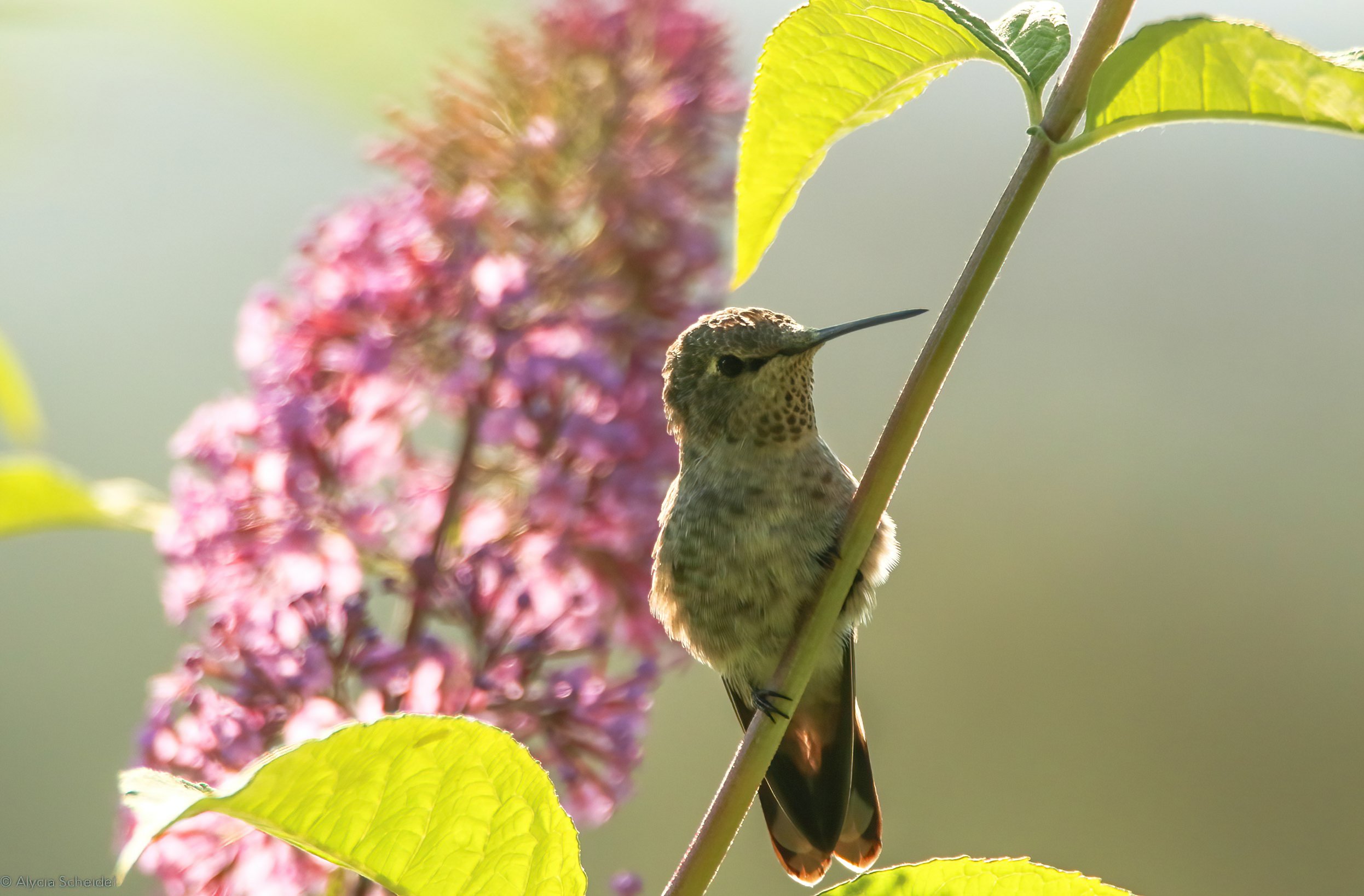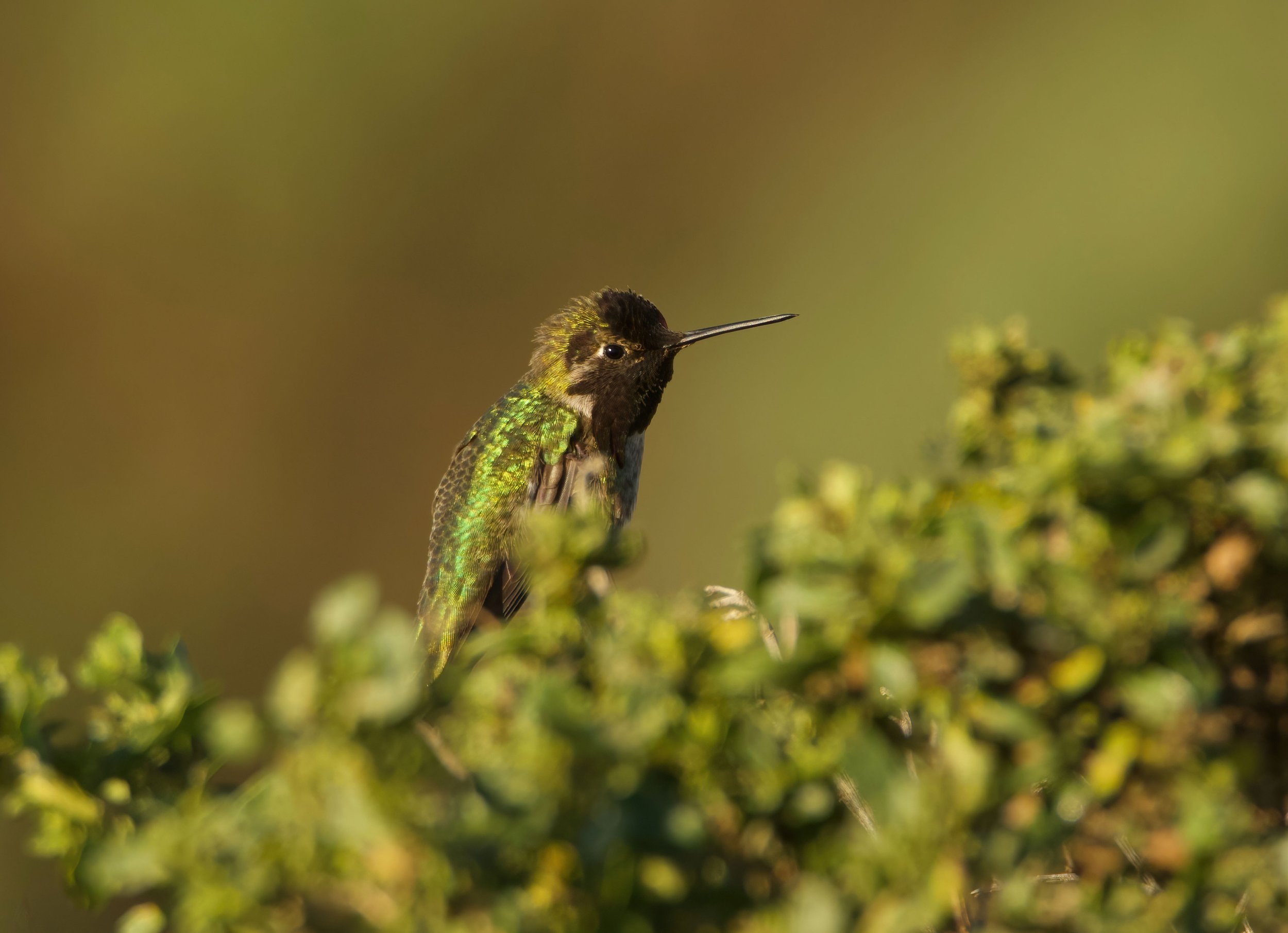Birdwise:
An Accidental Liturgy of the Hours
Trapped, inside my cabin:
one hummingbird—a glittering ruff,
eyes like live coals—
Somebody left the door ajar.
I awaken to tirade: Zee-chuppity-chup. Chirrr. Stumbling into the main room, I dodge a feathered missile. Wall to wall, it zips and flits, then hurls itself against the half-open slider, unable to find the gap. Neon extravagance flashes an SOS. And I want to help.
But that beak—will it turn on me?
Years later, while weeding flower beds, I am wonderstruck again by this madcap species. This time, they’re swooping through my front yard in eastern Washington, where we steward a few wild acres.
Black-chinned hummingbirds
barnstorm the foxgloves,
swivel and sideswipe—
sheer vibrating blur.
Who’d look away? Between skirmishes over nectar, beaks and corollas mesh like miniature sabers nimbly sheathed. This airborne charm of Beija flores, or flower kissers, will refuel every ten minutes today, bent on plundering one thousand blossoms.
If only I prayed as deeply, as widely, and often.
Unlike their flashier cousins scattered throughout the Americas, my garden invaders in cheerless drab and black could be wearing feathered balaclavas. Modest coloration suggests the undercover look. If I am attentive to their enigmas—their balletic feats and hovering pauses, even their battles—what might they reveal?
may my heart always be open to little
birds who are the secrets of living
~ e.e. cummings
Today’s sunlight shunts through the Ponderosa pines. A small dun-colored shape dives from a bough and its downy bib, or gorget, glints like an Egyptian collar, a crescent of pure imperial purple. Who’d guess those sequin-esque feathers lack pigment? Minute hairs, or barbules, contain air bubbles that simultaneously reflect light from two sources, creating iridescence.
In a world where too many living things face erasure, these plucky yet fragile creatures continue to thrive. Slight as a sigh at day’s end, from head to tail they are roughly the size of my index finger. A female once perched on my sunhat, her presence magical, her actual weight negligible as four jelly beans. I froze, catching my breath, the better to hear those cheeky pips among the silk flowers wreathing my hat. Does the Creator ever go still at the sound of our voices?
These featherweights seem divinely sent. Tingling at the thought, I read up on them. Despite their fleeting, prismatic elegance, ounce for ounce, they’re the toughest birds in my yard—and sometimes the biggest bullies, beaks menacing as thorns on the honey locust tree. They can drive off a hawk. They can dart, full-throttle, in any direction from an aerial stall.
However, their manic jousting for food unnerves me. When threatened, they weaponize their beaks and go for the throat—a disturbing parallel to our toxic national conversation. The comparison ushers in an equally troubling personal insight.
Amid the current news and rampant incivilities recklessly aired online and in person, I am mercurial as the birds at my feeder: My soul alternately bristles and grieves; binges, then shrugs; charges in, flees, quivers, scolds.
Like King David doing a 180 from exaltation to imprecation, hummingbirds arrive like stanzas, or psalmlets: exulting one moment, and the next, seeing red. When I witness another turf war at the feeder, it feels like a springboard. I pray for polarized people and their politics, starting with my own state of mind: Jehovah Most Just, may truth guide me, tempered by mercy.
This pairing of thought and wing reminds me of an ancient practice: the liturgy of the hours. Since medieval times, praying monastics have heeded the bells rung at the hinges of the day: dawn, noon, dusk, dark. Exact times and frequency vary, depending on the group. I resolve to use random avian sightings as nudges to do likewise—perhaps venture further. St. Paul urges us to “pray without ceasing.”
Incessant attempts at speech, however, like wings beating 1,200 times per minute, might prove chancy. My sentences tend to loop and pivot midair, sometimes, mid-utterance. Thoughts effervesce or pall, jockey for position; phrases pulsate, then sputter out.
Prayer: sometimes plodding; other times, aerial alchemy.
Tiny feet, madly cycling:
hope alights, honoring
the chosen route,flower by flower.
Lately, with every bird encountered, no matter its type, I try to enact a mindful pause.
Robins at dawn search out succulent worms: Holy Spirit, show me a word or phrase juicy enough for daylong meditation . . .
At lunchtime, daredevil swallows model playfulness: Father of Flight, revive my impish, ten-year-old self . . .
Near dusk, a mourning dove’s five-note, fluting sigh sounds like “Ha-ah - le - lu - jah.” Then, becoming more plaintive, it evokes tender expressions of solidarity for struggling family and friends: Savior, draw them under your wing . . .
At midnight, a barred owl in the woods jars me awake; I interlace my hands like a nest over my heart, mindfully breathe God’s name: Yah - weh . . . Yah - weh . . .
The feather flew, not because of anything in itself,
but because the air bore it along.
Thus am I, a feather on the breath of God.
~ Hildegard of Bingen, 12th century Abbess and polymath
Yielded and portable: Aren’t these qualities the test as well as the soul of devotion? Move us Lord, by the power of Love. Teach us to see through your eyes . . .
Again, God’s elfin stunt fliers expand my outlook. They perceive ultraviolet colors we’ve yet to name in hues we will never glimpse. Similarly, as I zoom or bumble toward God, the scope of possibilities widens, allowing me moments of unimagined insight.
What would it be like to live so attuned to creation that seeking God’s nourishing presence becomes second nature and shared conversation continual?
Can a person be a psalmlet?
My avian liturgy of the hours feels organic, even happenstance, a little quirky. The more I heed local birds as launchpads for prayer, the more I find heartfelt expressions arising. Will I ever pray with the headlong frequency and shining abandon of those flying jewels?
The Black-chinned hummingbirds not only remember each flower and feeder they’ve visited, they revisit the sites in the same order, returning to a bloom only after it’s had time to plump up again with nectar. I study their bills as they belly up to the honeysuckle blooms.
Oh, that my will might slip as sweetly into the Lord’s.
Ephemeral as a tiny bird’s flight path, sometimes I repeat words, synchronized with my breath. I am learning to align with the Source more often, by whatever means I can. Breath prayers help.
(inhale) I love you, oh Lord, my strength (exhale) direct my path.
A slower breath pattern involves brief pauses:
(inhale) Light of the world, (hold breath) rise in me
(exhale) illumine me (hold breath) enlighten me.
What daily encompasses us can also transport us when grace directs our thoughts and we, in turn, offer up our smallness, our wistful transience.
How does one turn repeatedly to God throughout the average day? Perhaps the passage of wings is the next needed prompt.
Sometimes, a memory will do. Years ago, in a cabin on Galliano Island . . .
Frenetic buzz-and-thrumming
of pearl-blurred wings,
a beak like a thorn,
needling glass—
I tear several pages from my journal, slowly turn and hold them out like a little hammock. Then I approach, sockless and scared. Curious. Thrilled.
With one tentative scoop and lift, rustling hope redirects the radiant being over the threshold. It hovers a moment, locking its enigmatic eyes with mine, then it rockets into the morning, leaving me changed, as if living sequins will linger, long after, ghosting beneath my skin.



